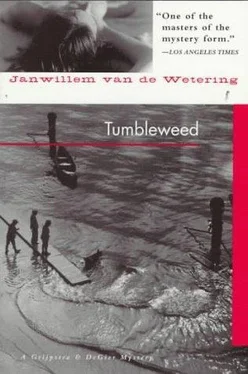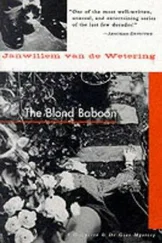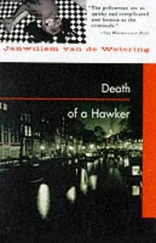Janwillem De Wetering - Tumbleweed
Здесь есть возможность читать онлайн «Janwillem De Wetering - Tumbleweed» весь текст электронной книги совершенно бесплатно (целиком полную версию без сокращений). В некоторых случаях можно слушать аудио, скачать через торрент в формате fb2 и присутствует краткое содержание. Жанр: Полицейский детектив, на английском языке. Описание произведения, (предисловие) а так же отзывы посетителей доступны на портале библиотеки ЛибКат.
- Название:Tumbleweed
- Автор:
- Жанр:
- Год:неизвестен
- ISBN:нет данных
- Рейтинг книги:4 / 5. Голосов: 1
-
Избранное:Добавить в избранное
- Отзывы:
-
Ваша оценка:
- 80
- 1
- 2
- 3
- 4
- 5
Tumbleweed: краткое содержание, описание и аннотация
Предлагаем к чтению аннотацию, описание, краткое содержание или предисловие (зависит от того, что написал сам автор книги «Tumbleweed»). Если вы не нашли необходимую информацию о книге — напишите в комментариях, мы постараемся отыскать её.
Tumbleweed — читать онлайн бесплатно полную книгу (весь текст) целиком
Ниже представлен текст книги, разбитый по страницам. Система сохранения места последней прочитанной страницы, позволяет с удобством читать онлайн бесплатно книгу «Tumbleweed», без необходимости каждый раз заново искать на чём Вы остановились. Поставьте закладку, и сможете в любой момент перейти на страницу, на которой закончили чтение.
Интервал:
Закладка:
's heaven? How long have you been here?"
"I arrived yesterday."
"You still have time," the fat woman said.
He gave her two guilders and they thought of a number together and she scribbled it in her book with a pencil stub. He lifted his hat and she squeezed his forearm. The fat woman's hand was strong and he was rubbing his arm. "They all do it," he thought. "I'll be black and blue soon."
He wandered back, slowly, holding on to his brown parcel and stopping for coffee and orange juice. He smoked a cigar sitting on a cane chair on the sidewalk, rubbing his legs which didn't hurt, wondering what his wife would say if he told her that they would go and live here, and eventually he found himself back at the hotel where he stripped and took a shower and dressed again.
"Morning," Silva said, touching his forearm with gentle fingers and patting him softly on the shoulder. "Did you sleep well? This is the first time you have been in the tropics I believe."
"Yes," the commissaris said. "I slept very well. I even went for a walk this morning."
"It must be very interesting to see the island for the first time. What did you do?"
The commissaris described some of his adventures and Silva listened, smiling and urging him on.
"You did very well," Silva said, "and the Indian gave you a pack of cigarettes. Amazing. They only come here to cheat us with their vegetables, asking outrageous prices because we can't buy them anywhere else anyway and then they sail home again, laughing at us. But one of them gave you a present. Let me see the pack, please."
The commissaris gave him the cigarettes and Silva held them on the palm of his hand.
"Pielroja," he said, "excellent cigarettes. I have often told the merchants to stock them but they prefer the American brands which all taste the same."
"Keep it. I only smoke cigars."
"No," Silva said, returning the pack, "you must take it home to show it to your friends. I sometimes go to Colombia and I buy them over there. But it's very kind of you all the same. Thank you."
"Now," Silva said, "you want to know about Maria van Buren, who was once called Maria de Sousa and who is now dead."
"Yes."
"I am glad you came," Silva said "it's hard to talk to somebody on the telephone, especially if you don't know who you are talking to. This island of ours is a maze and how can I explain a maze talking into a piece of plastic?"
"It's difficult," the commissaris agreed.
"But you are here now and I can see your face. So now it's easier."
"Please tell me about her," the commissaris said.
11
"Yes," Chief Inspector Silva said, "I will tell you what I know. Some of it I have only found out very recently and some of it I have known for some time but even if you add it all up it may come to nothing."
The commissaris shivered, and Silva immediately showed concern.
"You haven't caught a chill, have you? It's this damned air conditioning. It's a comfort of course but a danger at the same time. This isn't our best season and the heat hits you like a hot towel when you step outside but here, in the offices, it's too cool. I'll turn the machine down a little."
"No, no," the commissaris said quickly, "I feel quite well, better, in fact, than I have felt in a long time. But I did, probably, shiver because of the change of temperature."
"All right. Maria de Sousa. But it's intricate, how can I begin to tell you about what goes on here, on the isla. Isla, we call it, a Spanish word. So many influences are acting and reacting together here that the climate, the mental climate, has a very strange character of itself. A peculiar character."
He paused and the commissaris waited.
"To begin with, everybody knows about everybody. I even know Maria personally, but if nobody had ever introduced us, if we had never gone to the same parties, or met on the beach, even then I would know her by name. And she would know about me. If you had mentioned my name in Amsterdam she could have told you a long story about me, possibly with a lot of truth in it although some of the details would have been grossly exaggerated. We do exaggerate here."
"Yes," the commissaris said.
"She comes from a good family. Her father is in business, legitimate business. He owns a wholesale company. He is also engaged in smuggling, but smuggling isn't illegal here, as long as no weapons are involved, or drugs. The Colombians bring us a lot of coffee, no duty is paid, and the bags are marked ' produce.' We grow no coffee here, of course. Nothing grows here except thorn trees and cactus and maybe some figs on the old plantations where the soil hasn't been tilled for many years. The coffee is sold at very competitive prices but the merchants make a profit for they can undercut the official export trade from the South American continent, and the smugglers who bring us the coffee also make a profit for they pay no tax and the price we pay them is higher than their own governments will pay. But our merchants are very clever. They don't pay in money but in goods, in whisky and cigarettes which the smugglers take back when they return."
"A profit is made both ways," the commissaris says, "and no local laws are broken."
"Exactly. Some of the merchants grow very rich."
"Does old Mr. de Sousa have many children?"
Silva smiled. "He has three daughters by his wife."
"There are other children?"
"Yes," Silva said. "There are others. A rich merchant will have mistresses. Some of them will live in adobe huts in the cunucu and others will live in Miami, in expensive apartments."
"Please continue," the commissaris said. "I am sorry I interrupted."
"Mr. de Sousa's daughters are beautiful and it was easy for them to find husbands, husbands the old man would approve of. Maria was the last to marry and she married an engineer, a proper Dutchman who, for a year or so, tried to start a small factory here but he gave up in the end. He had labor problems, our people are not very efficient perhaps, and textiles can be imported here from any country in the world. The shareholders of the company he worked for told him to give up. Mr. de Sousa wasn't pleased with the failure but there was nothing he could do about it, and Maria and her husband went to Holland. Then she divorced him, and she didn't marry again. Some rumors filtered back to us. It seemed she lived an immoral life, but she was living it at a great distance and we weren't concerned. She used to come twice a year and her father would meet her at the airport and take her home. Her father was concerned. He would hardly speak to her. After a while he stopped meeting her at the airport. There was a fight, he called her 'puta,' whore, and she was no longer allowed to live in his house, but she still kept coming, living in the same hotel where you live now."
The commissaris shivered again and Sliva jumped from his chair. "Just a minute," he said, "I'll get you some very hot tea laced with rum and with a few drops of lemon juice." He was gone for a few minutes while the commissaris enjoyed the view of the harbor. A dirty-looking tramp flying the Venezuelan flag was moored practically underneath the window, separated from the police station by the quay only. An old man with a yellow beard and a torn cap stood on the bridge and looked up. When he saw the commissaris he shouted something and shook his fist, then he disappeared into the cabin and a thick cloud of sooty smoke bulged from the ship's ancient funnel, spreading out slowly and blocking the view from the office.
"Here is your tea," Silva said.
"Somebody was shaking his fist at me," the commissaris said, "an old man with a yellow beard."
Silva laughed and looked out of the window.
"The old bastard has done it again. He probably thought it was I at the window. I caught him once, he was making a nuisance of himself in an expensive bar, and we arrested him. He broke a bottle on a sergeant's skull so he got locked up for a while. Ever since he tries to moor in that convenient spot over there so that he can smoke us out but we have air conditioning and he doesn't worry us. He is a nice old chap when he isn't drunk."
Читать дальшеИнтервал:
Закладка:
Похожие книги на «Tumbleweed»
Представляем Вашему вниманию похожие книги на «Tumbleweed» списком для выбора. Мы отобрали схожую по названию и смыслу литературу в надежде предоставить читателям больше вариантов отыскать новые, интересные, ещё непрочитанные произведения.
Обсуждение, отзывы о книге «Tumbleweed» и просто собственные мнения читателей. Оставьте ваши комментарии, напишите, что Вы думаете о произведении, его смысле или главных героях. Укажите что конкретно понравилось, а что нет, и почему Вы так считаете.












